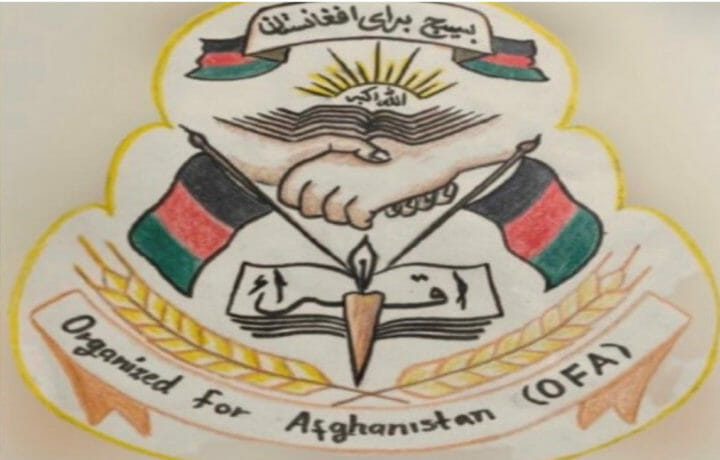I have often heard the myth that Afghans need a strong central government and that they are not a nation built for democracy. Far from forcing un-Afghan democratic ideas upon Afghans, in many respects, the international community held Afghans back from embracing all the democracy reforms they sought. The formation of grassroots movements among the youth and various marginalized groups, who are standing up to the Taliban-Haqqani terrorist group, might lead some to reconsider their understanding of Afghan democratic desires.
Organized for Afghanistan (OFA) movement
The National Resistance Front is one of many organizations that are trying to carve out alternative paths to a more stable Afghanistan. Another group seeking to stabilize Afghanistan is the Organized for Afghanistan (OFA) movement.
According to a draft of the OFA’s charter, they plan to use a “whole-of-Afghanistan” approach to preserve the societal gains of the last 20 years before the Taliban-Haqqani regime destroy them. Organized for Afghanistan seems to be very focused on bringing-in new ideas from younger Afghans around the globe to increase “Pan-Afghanism” and develop an Afghan nation that can find stability, regain its sovereignty, and improve itself continuously, without falling into the age-old traps of brinksmanship politics that lead to collapse.
OFA is hoping new ideas, bold thinking, and strategic planning can help Afghans find the unity needed to reverse the Taliban-Haqqani power grab.
In the OFA Vision you can see their goals and some of their paths towards them.
“Afghanistan, with its vast and diversified reserves of mineral resources, fertile terrain, and strategic location, has the potential to become a major trade, transit, and economic integration roundabout in the Heart of Asia, contributing to the global growth and prosperity.
The OFA vision for Afghanistan is to have Pluralistic Politics, Vibrant Economy, and Strategic Security—while she enjoys close and enduring ties with her neighbors and the world as a whole.”
Overcoming Threats
Without naming them, OFA details and aims to counter many of the threats that Pakistan regularly poses to Afghanistan stability, outward connectivity, and economic and societal growth. They note that regional hegemons have continued to see a stable, organized and capable Afghan state as a threat. OFA points out that they (Pakistan) regularly use hybrid warfare, international diplomacy, and economic warfare to harm the Afghan state. OFA recognizes that to strengthen Afghanistan the citizens must be aware of, and counter the efforts of Pakistan to erode Afghan faith in the Afghan government and weaken national security forces.
OFA is preparing three large efforts to bring the Afghan people together and provide them a path to a better future. First, they will uphold their principle of Pan-Afghanism while strategically framing issues facing Afghans and help Afghans gain access to factual information about issues and solutions. Second, OFA will launch ad public diplomacy campaign that uses new ideas and a strategic framework to empower Afghans, and disempower the South Asia lobbyists that are keeping many nations disconnected from Afghans. Finally, OFA will bring together Afghan visionaries and help them share ideas, pursue solutions, and in a united effort –make changes that will last.
OFA is trying to synchronize Afghans in Afghanistan and the diaspora, along with friendly nations and NGOs to achieve the following.
- “An Afghanistan with a Republic architecture and civil constitution capable of solving the problem of moral autonomy, individualism, and social order—by democratic means—to strengthen social contract.” Their belief is that real checks and balances can remove tyranny, elitism, nepotism, and corruption.
- “An Afghanistan with organizational, industrial, and technological proficiency and a market-oriented mobilized private sector.” OFA sees a nation that can be an economic and energy “roundabout” in Asia allowing them to use agribusiness and industry to decrease reliance on donor nations.
- “An Afghanistan with domestic tranquility, defense of national unity behind secure frontier, secure strategic advantage.” OFA wants to reduce the capability of threats from nations like Pakistan, and increase the international affairs competence of Afghans in government, business, and civil society.
To achieve the ideas above OFA is focused on the following efforts. “People, Education, International Institutions, Information, and Services.”
What’s Next?
In the next two years, OFA is focused on organizing itself and launching their efforts globally. The next few years will be focused on integrating efforts and gathering the majority of Afghans to their team as they steadily rebuild Afghanistan from the inside.
A few points that stood out to me about the future Afghanistan that OFA envisions are below. They want an Islamic Republic that is an independent, unitary and indivisible state; where all faiths are free to perform their own beliefs. OFA recognizes the Loya Jirga or grand assembly, as the highest expression of the Afghan national sovereignty, which derives its legitimacy from direct popular participation.
OFA wants a centralized presidential government that effectively uses Artificial Intelligence technology to better serve the public interest, in a less costly and more effective way. They want a government that is smaller, more respected, and less intrusive—while focusing on being more equal. OFA, like NRF, supports the devolution of authorities to provincial capitals and “will work with an independent research entity to conduct cutting-edge research to identity areas (e.g., budget, etc.) for devolution, and to streamline the state system.”
Finally, OFA wants to “discourage policymaking that is driven by grandstanding and emotions which have held Afghanistan back.” They plan to use international expertise to improve capacity and wisely plan to utilize the trillions of dollars in national resources to build a legitimate national economy.




